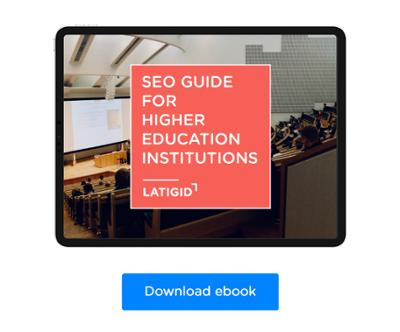
This blog article, "Higher education SEO: On-page optimization guide," is your go-to resource for understanding the crucial role of on-page SEO in enhancing your institution's online visibility and attracting the right audience. Whether you're a university administrator, a marketing professional, or anyone involved in the higher education sector, this guide will equip you with the knowledge and strategies needed to improve your website's search engine ranking and ultimately drive enrollment and engagement.
Why on-page optimization matters in higher education SEO
On-page optimization plays a crucial role in the digital marketing and online visibility strategies of higher education institutions. Here are several reasons why on-page optimization matters in the context of higher education:
Search engine rankings
On-page optimization directly impacts how search engines rank your pages. By optimizing elements like title tags, meta descriptions, header tags, and content, you increase the likelihood of search engines recognizing your content as relevant to user queries.
Relevance to target audience
Effective on-page optimization ensures that the content on your pages is relevant to the needs and queries of your target audience, which is crucial in the competitive landscape of higher education.
User experience (UX)
A well-optimized page contributes to a positive user experience. Search engines consider user experience signals, such as page load speed, mobile-friendliness, and clear navigation. A positive user experience can lead to higher rankings and increased engagement.
Keyword optimization
On-page SEO involves strategically incorporating relevant keywords in your content. This helps search engines understand the main topics of your pages, making it more likely for your content to appear in search results when users search for related terms.
Content quality and depth
On-page optimization encourages the creation of high-quality, informative, and engaging content. Educational institutions can showcase their expertise, programs, faculty, and campus life, attracting prospective students and providing valuable information to current ones.
Local SEO for campus locations
For universities with multiple campuses, on-page optimization is crucial for local SEO. Ensuring that each campus location has a well-optimized page with relevant information helps prospective students find the information they need based on their location.
Social media integration
On-page optimization extends to social media integration. Sharing options, embedded feeds, and links to official social media profiles enhance the online presence of higher education institutions and contribute to overall SEO efforts.
Accessibility
Making your website accessible to all users, including those with disabilities, is an essential aspect of on-page optimization. Search engines consider accessibility as a factor in rankings, and it reflects positively on the reputation of educational institutions.
Competitive advantage
Effective on-page optimization gives your institution a competitive advantage. If your pages are well-optimized, they are more likely to appear in search results ahead of competitors, attracting more attention from potential students, faculty, and partners.
Related article: SEO for Higher Education: Optimizing Program Pages with SEO
On-page optimization guide in higher education SEO
Creating a effective on-page optimization strategy for higher education requires careful planning and attention to detail. Here's a step-by-step guide to help you optimize web pages for colleges and universities:
Keyword research
- Start by researching relevant keywords and phrases that prospective students might use when searching for higher education options.
- Utilize keyword research tools to identify high-search volume and low-competition keywords.
- Consider long-tail keywords that are specific to your programs and location.
Content creation
- Develop high-quality, informative, and engaging content around your chosen keywords.
- Create unique content for each program, department, or major, highlighting their features and benefits.
- Prioritize content that addresses the needs and questions of prospective students (e.g., admission requirements, financial aid, campus life, etc.).
On-page SEO
- Place your target keywords strategically in the following on-page elements:
- Title tags
- Meta descriptions
- Header tags (H1, H2, H3, etc.)
- URL structure
- Image alt tags
- Body content (naturally integrate keywords)
Mobile optimization
- Ensure that your website is mobile-responsive for a seamless user experience on smartphones and tablets.
- Test your pages on various devices and screen sizes to guarantee proper rendering.
Page load speed
- Optimize page load times by compressing images, using browser caching, and minimizing unnecessary code.
- Faster-loading pages improve user experience and can positively impact search rankings.
Internal linking
- Implement a logical and user-friendly internal linking structure to help visitors navigate your website.
- Link related pages to provide additional information and improve SEO.
User experience (UX) and design
- Prioritize a clean and intuitive website design.
- Ensure easy navigation with a clear menu structure and a prominent search bar.
- Use clear, concise headings and subheadings to break up content.
Calls-to-action (CTAs)
- Include compelling CTAs throughout your pages to guide visitors toward desired actions, such as requesting information, applying, or scheduling a visit.
Multimedia elements
- Enhance content with relevant images, videos, infographics, and interactive elements.
- Optimize images for web by compressing them and using appropriate file formats.
Schema markup
- Implement schema markup (structured data) to provide search engines with additional information about your institution, courses, events, and other relevant data.
Local SEO
- Optimize for local SEO by creating and verifying a Google My Business profile.
- Ensure that your institution's name, address, and phone number (NAP) are consistent across all online platforms.
Content updates
- Regularly update and refresh your content to keep it relevant and accurate.
- Annually review and revise program information, admission requirements, and other critical details.
User reviews and testimonials
- Encourage students and alumni to leave reviews and testimonials on platforms like Google, Yelp, and your website.
- Positive reviews can influence prospective students' decisions.
Analytics and monitoring
- Implement website analytics (e.g., Google Analytics) to track user behavior, traffic sources, and conversion rates.
- Continuously monitor and analyze data to make informed adjustments to your optimization strategy.
Accessibility
- Ensure that your website is accessible to individuals with disabilities by following WCAG (Web Content Accessibility Guidelines) standards.
Security
- Keep your website secure by regularly updating software, using HTTPS, and implementing security protocols to protect user data.
Remember that on-page optimization is an ongoing process. Regularly review and adapt your strategy based on user feedback, analytics, and changes in search engine algorithms to maintain and improve your online visibility and effectiveness in reaching prospective students.
Related article: Why Higher Education Institutions Need an SEO Agency to Grow
About LATIGID
We are a higher education marketing agency. We help you grow by increasing website traffic, generating more student leads, and closing those leads into enrollment. With a deep understanding of the latest industry trends and best practices, we are well equipped to help your institution grow.
If you are looking for a higher education marketing agency to partner with, check our page to see what we can do for you!
Download our SEO guide and learn how to build a strategy to optimize your Higher Education Institution's website






